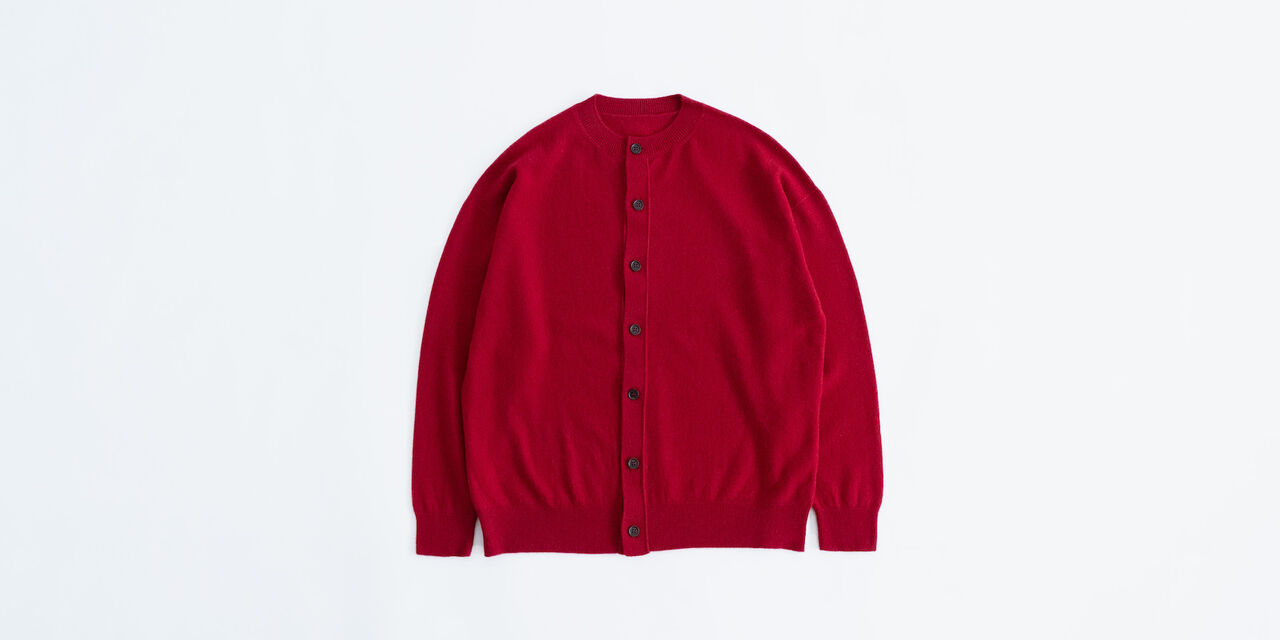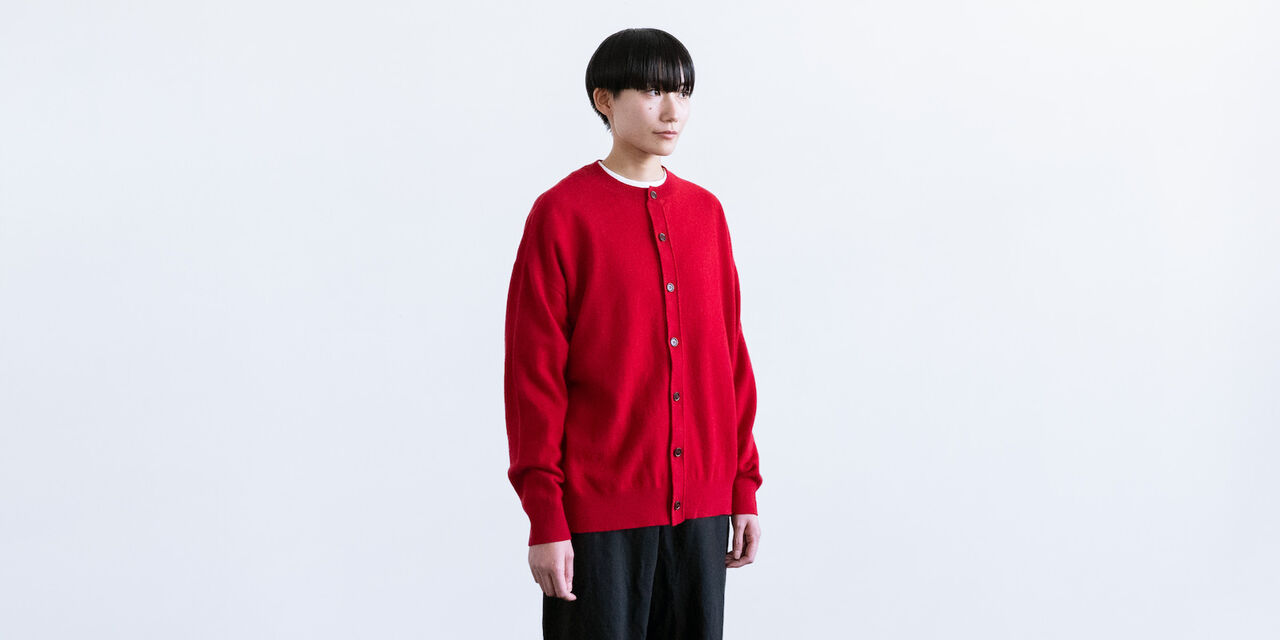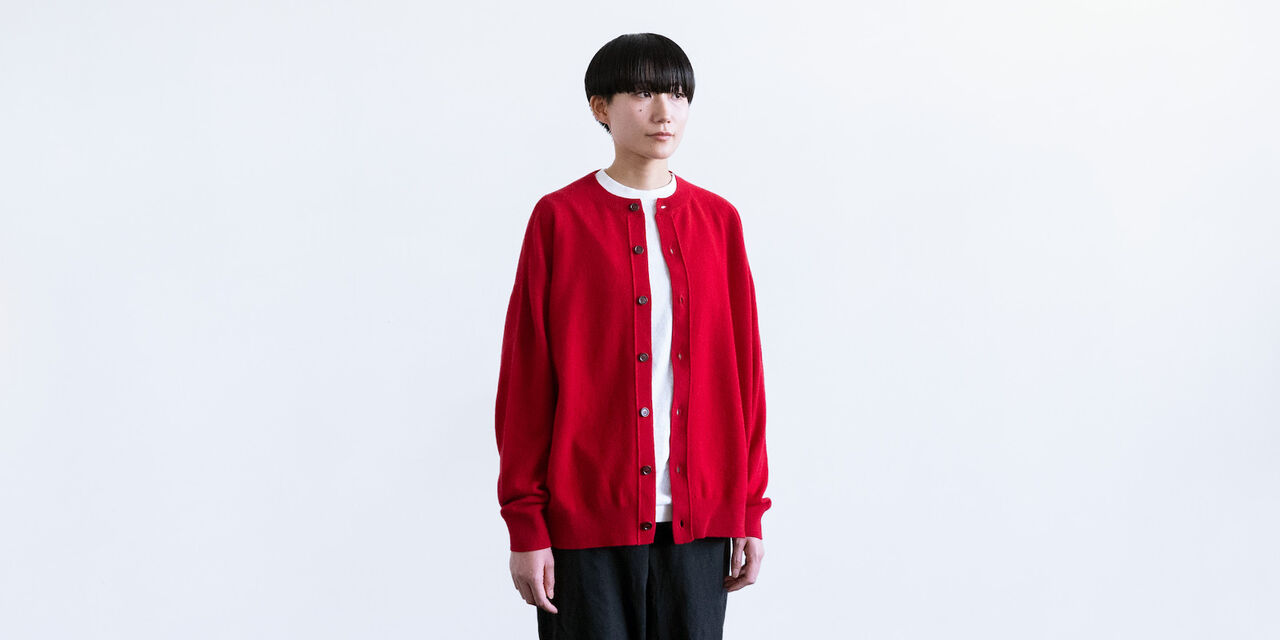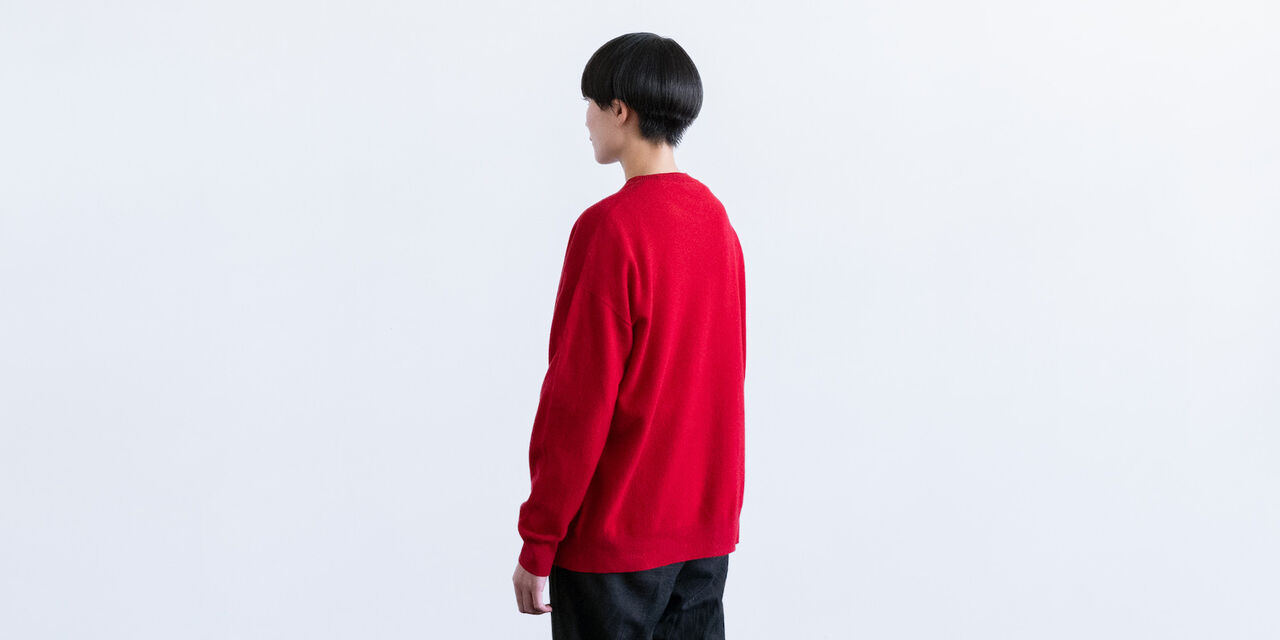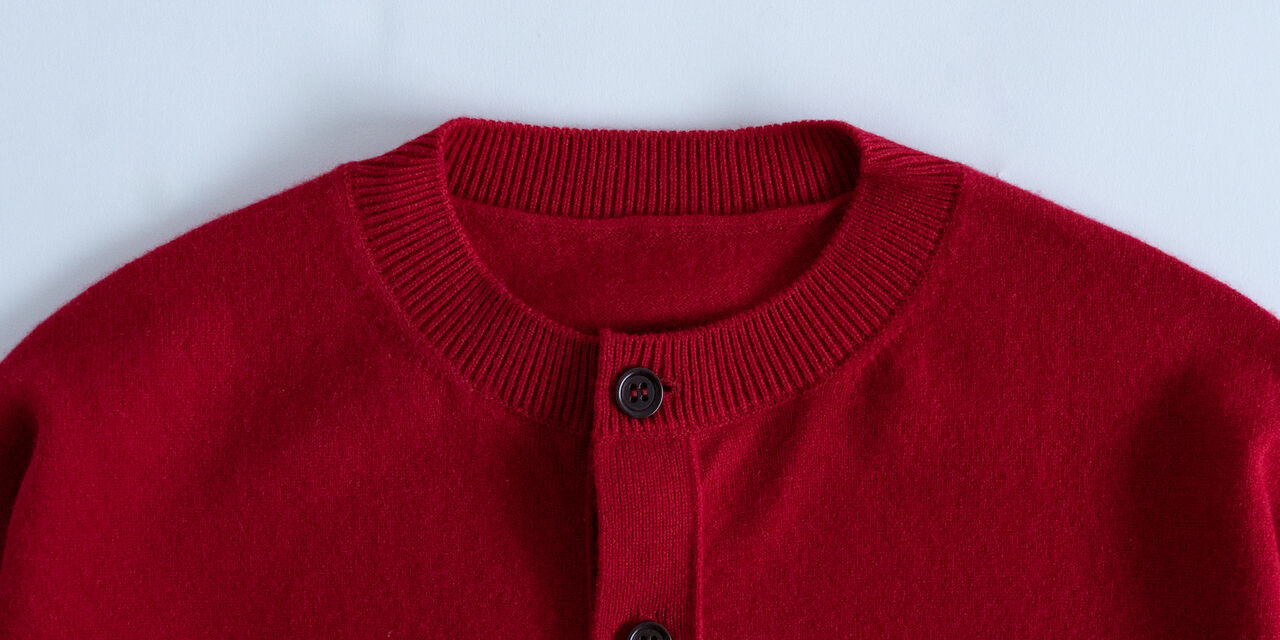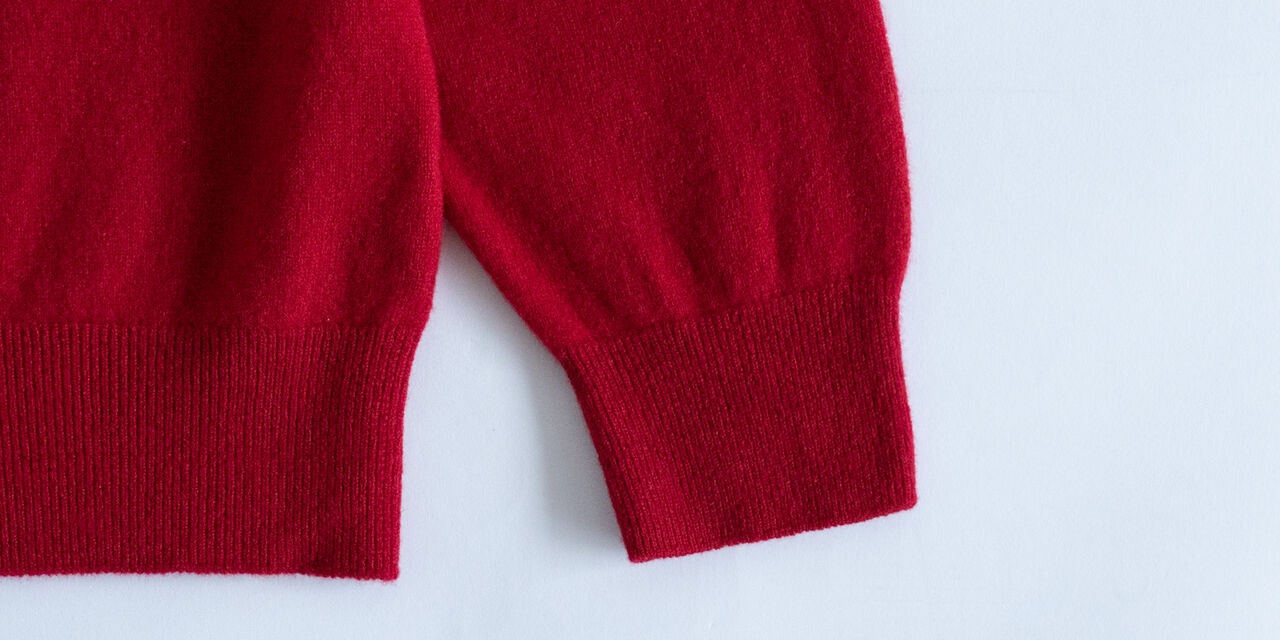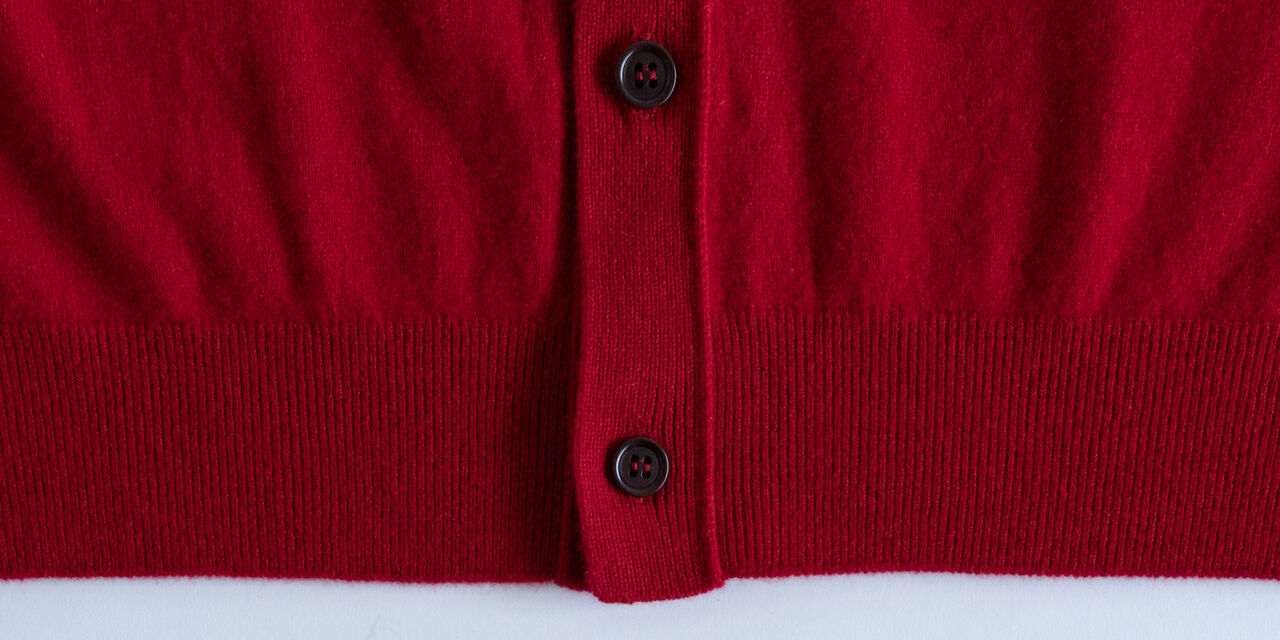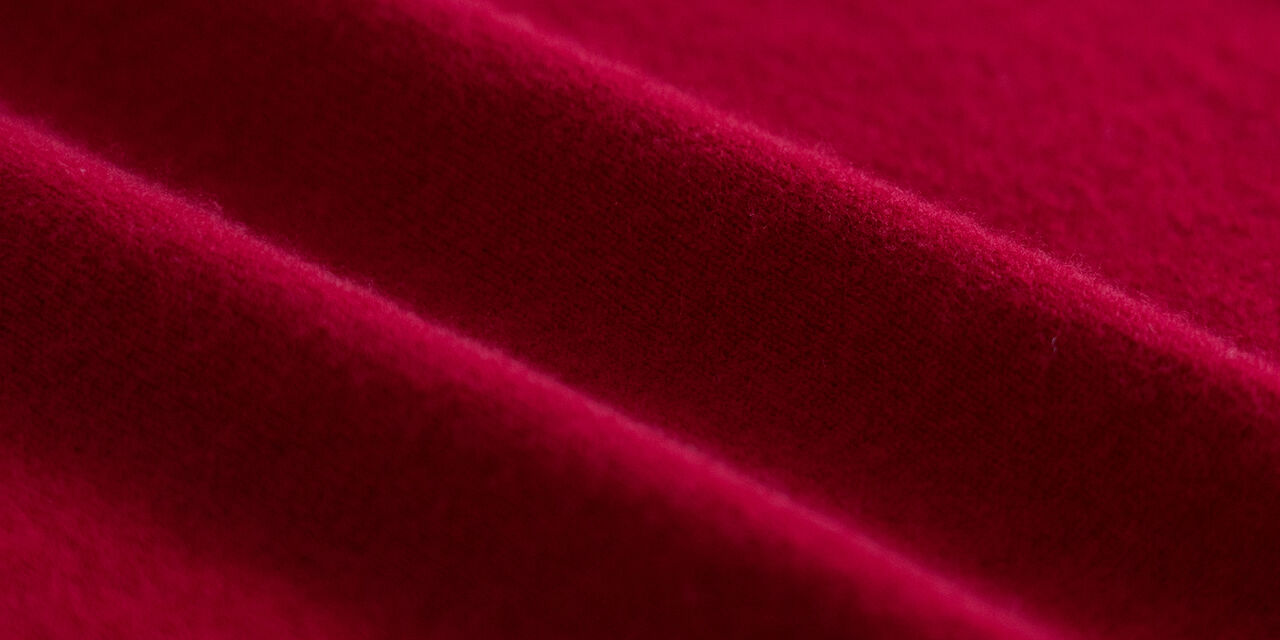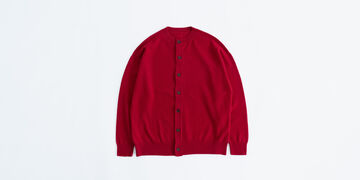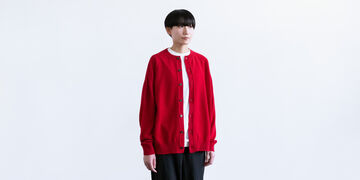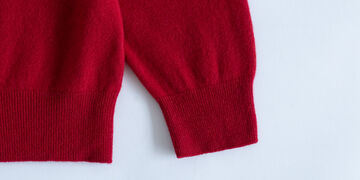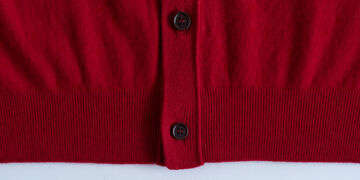| Length | Chest width | Shoulder width | Sleeve length | |
|---|---|---|---|---|
| S | 61 | 112 | 54 | 49 |
| M | 64 | 118 | 57 | 51 |
| L | 67 | 122 | 60 | 53 |
D&DEPARTMENT
Wool Crewneck Cardigan
Made in
Japan
Our Original Wool Crewneck Cardigan Is Perfect for Cold or Chilly Weather Through Early Spring.
This cardigan features a wide, relaxed silhouette with dropped shoulders for easy movement and the option to wear it as a lightweight outer layer. Whether layered over a shirt or worn as innerwear, its simple design will complement a variety of styles. Made using the Wholegarment technique, the sweater naturally conforms to the wearer's body shape. Perfect for both casual and formal occasions, enjoy the sophisticated simplicity of this cardigan.

Wataru Shibuya, a Knitting Director
Mr. Shibuya's grandfather ran a knitting factory, while his father ran a factory specializing in twisted yarn. Mr. Shibuya learned sewing and pattern making from his grandmother, and started making his own clothes in his middle school. When he was around 25, he decided to pursue a career in knitting and started his own brand.
However, after the Great East Japan Earthquake in 2011, he changed his mind. He said, "At that time, I sacrificed sleep every day to work toward my goals, develop my brand, and do what I wanted to do. Eventually, I realized that I was only pursuing my own ambitions and not helping those affected by the disaster. When I work tirelessly without a break, my goal is to use that hard work to benefit others. That's when I began to focus on preserving Japan's textile industry as the core of my activities."

The secrets and origins of high-quality wool
While researching yarn materials and textures, Mr. Shibuya became interested in the soft and durable wool from sheep in Uruguay, South America. With little information available about Uruguayan wool, he spent a month in Uruguay, living with local gauchos and working on ranches to understand the environment in which the sheep were raised.

Uruguayan sheep graze freely on the vast grasslands. Gauchos on horseback move some 12,000 sheep to designated pastures, monitor their health, assist with births, and shear their wool once a year. Young sheep with unsteady feet are gently guided, and newborn sheep have sometimes been carried on the gauchos' laps.

Uruguayan wool is known for its softness and elasticity.
The softness comes from the fine texture of the raw wool, while the elasticity comes from the natural crimp of the sheep's wool. Mr. Shibuya collects wool from about 200 sheep and inspects it. Of these, the Uruguayan Merino sheep have a consistent crimp that is quite pronounced. This crimp contributes to the elasticity of the sweater.

Made in Japan Quality
Motivated to protect Japanese factories, Shibuya partners with artisans by visiting domestic factories and collaborating with craftsmen to develop knitwear.
For this project, Fukaki Woollen Textile, known for its expertise in luxury materials and often referred to as the "Fukaki of Cashmere," handled the dyeing and spinning processes. The sweaters were made with yarns from Fukaki Woollen Textile and manufactured by Knit Okazaki, a factory specializing in the production of "wholegarment" knits. Ishikawa Senko is responsible for the final details and washing that determine the texture of the knitwear.
These trusted artisans, specially selected by Shibuya, played an essential role in realizing his vision.
This cardigan features a wide, relaxed silhouette with dropped shoulders for easy movement and the option to wear it as a lightweight outer layer. Whether layered over a shirt or worn as innerwear, its simple design will complement a variety of styles. Made using the Wholegarment technique, the sweater naturally conforms to the wearer's body shape. Perfect for both casual and formal occasions, enjoy the sophisticated simplicity of this cardigan.

Wataru Shibuya, a Knitting Director
Mr. Shibuya's grandfather ran a knitting factory, while his father ran a factory specializing in twisted yarn. Mr. Shibuya learned sewing and pattern making from his grandmother, and started making his own clothes in his middle school. When he was around 25, he decided to pursue a career in knitting and started his own brand.
However, after the Great East Japan Earthquake in 2011, he changed his mind. He said, "At that time, I sacrificed sleep every day to work toward my goals, develop my brand, and do what I wanted to do. Eventually, I realized that I was only pursuing my own ambitions and not helping those affected by the disaster. When I work tirelessly without a break, my goal is to use that hard work to benefit others. That's when I began to focus on preserving Japan's textile industry as the core of my activities."

The secrets and origins of high-quality wool
While researching yarn materials and textures, Mr. Shibuya became interested in the soft and durable wool from sheep in Uruguay, South America. With little information available about Uruguayan wool, he spent a month in Uruguay, living with local gauchos and working on ranches to understand the environment in which the sheep were raised.

Uruguayan sheep graze freely on the vast grasslands. Gauchos on horseback move some 12,000 sheep to designated pastures, monitor their health, assist with births, and shear their wool once a year. Young sheep with unsteady feet are gently guided, and newborn sheep have sometimes been carried on the gauchos' laps.

Uruguayan wool is known for its softness and elasticity.
The softness comes from the fine texture of the raw wool, while the elasticity comes from the natural crimp of the sheep's wool. Mr. Shibuya collects wool from about 200 sheep and inspects it. Of these, the Uruguayan Merino sheep have a consistent crimp that is quite pronounced. This crimp contributes to the elasticity of the sweater.

Made in Japan Quality
Motivated to protect Japanese factories, Shibuya partners with artisans by visiting domestic factories and collaborating with craftsmen to develop knitwear.
For this project, Fukaki Woollen Textile, known for its expertise in luxury materials and often referred to as the "Fukaki of Cashmere," handled the dyeing and spinning processes. The sweaters were made with yarns from Fukaki Woollen Textile and manufactured by Knit Okazaki, a factory specializing in the production of "wholegarment" knits. Ishikawa Senko is responsible for the final details and washing that determine the texture of the knitwear.
These trusted artisans, specially selected by Shibuya, played an essential role in realizing his vision.
Material: 100% pure wool
D&DEPARTMENT
Dyeing and spinning: Fukaki Woollen Textile Co.,Ltd.
Founded in 1887. Fukaki Woollen Textile Co.,Ltd. renowned for their expertise in luxury materials and often referred to as the "Fukaki of Cashmere," handled the dyeing and spinning processes.
Wholegarment knitting: Knit Okazaki
Founded in 1965. Knit Okazaki has been specializing in wholegarment knitting since the introduction of SHIMA SEIKI's Wholegarment knitting machine in 1995.
Dyeing and spinning: Fukaki Woollen Textile Co.,Ltd.
Founded in 1887. Fukaki Woollen Textile Co.,Ltd. renowned for their expertise in luxury materials and often referred to as the "Fukaki of Cashmere," handled the dyeing and spinning processes.
Wholegarment knitting: Knit Okazaki
Founded in 1965. Knit Okazaki has been specializing in wholegarment knitting since the introduction of SHIMA SEIKI's Wholegarment knitting machine in 1995.
・After wearing, remove dust with a brush and hang it on a hanger for 2 to 3 days to adjust the humidity. This will help the sweater last longer.
・We recommend dry cleaning or hand washing.
・If you wash by hand, dissolve a neutral detergent in water or lukewarm water at less than 30 C (86 F), press gently, and then rinse with water. Please finish in a short time. Then put it in a laundry net, spin it in the washing machine for 30 seconds, adjust its shape and dry it flat in the shade.
・Do not rub the surface when hand washing. Do not tumble dry as this may cause shrinkage.
・If you are concerned about creases after washing, adjust the shape and apply steam while slightly lifting the iron away from the sweater to remove creases.
・Do not pull pills, only use a pill brush or small scissors to remove them.
・We recommend dry cleaning or hand washing.
・If you wash by hand, dissolve a neutral detergent in water or lukewarm water at less than 30 C (86 F), press gently, and then rinse with water. Please finish in a short time. Then put it in a laundry net, spin it in the washing machine for 30 seconds, adjust its shape and dry it flat in the shade.
・Do not rub the surface when hand washing. Do not tumble dry as this may cause shrinkage.
・If you are concerned about creases after washing, adjust the shape and apply steam while slightly lifting the iron away from the sweater to remove creases.
・Do not pull pills, only use a pill brush or small scissors to remove them.
Our Original Wool Crewneck Cardigan Is Perfect for Cold or Chilly Weather Through Early Spring.
This cardigan features a wide, relaxed silhouette with dropped shoulders for easy movement and the option to wear it as a lightweight outer layer. Whether layered over a shirt or worn as innerwear, its simple design will complement a variety of styles. Made using the Wholegarment technique, the sweater naturally conforms to the wearer's body shape. Perfect for both casual and formal occasions, enjoy the sophisticated simplicity of this cardigan.

Wataru Shibuya, a Knitting Director
Mr. Shibuya's grandfather ran a knitting factory, while his father ran a factory specializing in twisted yarn. Mr. Shibuya learned sewing and pattern making from his grandmother, and started making his own clothes in his middle school. When he was around 25, he decided to pursue a career in knitting and started his own brand.
However, after the Great East Japan Earthquake in 2011, he changed his mind. He said, "At that time, I sacrificed sleep every day to work toward my goals, develop my brand, and do what I wanted to do. Eventually, I realized that I was only pursuing my own ambitions and not helping those affected by the disaster. When I work tirelessly without a break, my goal is to use that hard work to benefit others. That's when I began to focus on preserving Japan's textile industry as the core of my activities."

The secrets and origins of high-quality wool
While researching yarn materials and textures, Mr. Shibuya became interested in the soft and durable wool from sheep in Uruguay, South America. With little information available about Uruguayan wool, he spent a month in Uruguay, living with local gauchos and working on ranches to understand the environment in which the sheep were raised.

Uruguayan sheep graze freely on the vast grasslands. Gauchos on horseback move some 12,000 sheep to designated pastures, monitor their health, assist with births, and shear their wool once a year. Young sheep with unsteady feet are gently guided, and newborn sheep have sometimes been carried on the gauchos' laps.

Uruguayan wool is known for its softness and elasticity.
The softness comes from the fine texture of the raw wool, while the elasticity comes from the natural crimp of the sheep's wool. Mr. Shibuya collects wool from about 200 sheep and inspects it. Of these, the Uruguayan Merino sheep have a consistent crimp that is quite pronounced. This crimp contributes to the elasticity of the sweater.

Made in Japan Quality
Motivated to protect Japanese factories, Shibuya partners with artisans by visiting domestic factories and collaborating with craftsmen to develop knitwear.
For this project, Fukaki Woollen Textile, known for its expertise in luxury materials and often referred to as the "Fukaki of Cashmere," handled the dyeing and spinning processes. The sweaters were made with yarns from Fukaki Woollen Textile and manufactured by Knit Okazaki, a factory specializing in the production of "wholegarment" knits. Ishikawa Senko is responsible for the final details and washing that determine the texture of the knitwear.
These trusted artisans, specially selected by Shibuya, played an essential role in realizing his vision.
This cardigan features a wide, relaxed silhouette with dropped shoulders for easy movement and the option to wear it as a lightweight outer layer. Whether layered over a shirt or worn as innerwear, its simple design will complement a variety of styles. Made using the Wholegarment technique, the sweater naturally conforms to the wearer's body shape. Perfect for both casual and formal occasions, enjoy the sophisticated simplicity of this cardigan.

Wataru Shibuya, a Knitting Director
Mr. Shibuya's grandfather ran a knitting factory, while his father ran a factory specializing in twisted yarn. Mr. Shibuya learned sewing and pattern making from his grandmother, and started making his own clothes in his middle school. When he was around 25, he decided to pursue a career in knitting and started his own brand.
However, after the Great East Japan Earthquake in 2011, he changed his mind. He said, "At that time, I sacrificed sleep every day to work toward my goals, develop my brand, and do what I wanted to do. Eventually, I realized that I was only pursuing my own ambitions and not helping those affected by the disaster. When I work tirelessly without a break, my goal is to use that hard work to benefit others. That's when I began to focus on preserving Japan's textile industry as the core of my activities."

The secrets and origins of high-quality wool
While researching yarn materials and textures, Mr. Shibuya became interested in the soft and durable wool from sheep in Uruguay, South America. With little information available about Uruguayan wool, he spent a month in Uruguay, living with local gauchos and working on ranches to understand the environment in which the sheep were raised.

Uruguayan sheep graze freely on the vast grasslands. Gauchos on horseback move some 12,000 sheep to designated pastures, monitor their health, assist with births, and shear their wool once a year. Young sheep with unsteady feet are gently guided, and newborn sheep have sometimes been carried on the gauchos' laps.

Uruguayan wool is known for its softness and elasticity.
The softness comes from the fine texture of the raw wool, while the elasticity comes from the natural crimp of the sheep's wool. Mr. Shibuya collects wool from about 200 sheep and inspects it. Of these, the Uruguayan Merino sheep have a consistent crimp that is quite pronounced. This crimp contributes to the elasticity of the sweater.

Made in Japan Quality
Motivated to protect Japanese factories, Shibuya partners with artisans by visiting domestic factories and collaborating with craftsmen to develop knitwear.
For this project, Fukaki Woollen Textile, known for its expertise in luxury materials and often referred to as the "Fukaki of Cashmere," handled the dyeing and spinning processes. The sweaters were made with yarns from Fukaki Woollen Textile and manufactured by Knit Okazaki, a factory specializing in the production of "wholegarment" knits. Ishikawa Senko is responsible for the final details and washing that determine the texture of the knitwear.
These trusted artisans, specially selected by Shibuya, played an essential role in realizing his vision.
Material: 100% pure wool
D&DEPARTMENT
Dyeing and spinning: Fukaki Woollen Textile Co.,Ltd.
Founded in 1887. Fukaki Woollen Textile Co.,Ltd. renowned for their expertise in luxury materials and often referred to as the "Fukaki of Cashmere," handled the dyeing and spinning processes.
Wholegarment knitting: Knit Okazaki
Founded in 1965. Knit Okazaki has been specializing in wholegarment knitting since the introduction of SHIMA SEIKI's Wholegarment knitting machine in 1995.
Dyeing and spinning: Fukaki Woollen Textile Co.,Ltd.
Founded in 1887. Fukaki Woollen Textile Co.,Ltd. renowned for their expertise in luxury materials and often referred to as the "Fukaki of Cashmere," handled the dyeing and spinning processes.
Wholegarment knitting: Knit Okazaki
Founded in 1965. Knit Okazaki has been specializing in wholegarment knitting since the introduction of SHIMA SEIKI's Wholegarment knitting machine in 1995.
・After wearing, remove dust with a brush and hang it on a hanger for 2 to 3 days to adjust the humidity. This will help the sweater last longer.
・We recommend dry cleaning or hand washing.
・If you wash by hand, dissolve a neutral detergent in water or lukewarm water at less than 30 C (86 F), press gently, and then rinse with water. Please finish in a short time. Then put it in a laundry net, spin it in the washing machine for 30 seconds, adjust its shape and dry it flat in the shade.
・Do not rub the surface when hand washing. Do not tumble dry as this may cause shrinkage.
・If you are concerned about creases after washing, adjust the shape and apply steam while slightly lifting the iron away from the sweater to remove creases.
・Do not pull pills, only use a pill brush or small scissors to remove them.
・We recommend dry cleaning or hand washing.
・If you wash by hand, dissolve a neutral detergent in water or lukewarm water at less than 30 C (86 F), press gently, and then rinse with water. Please finish in a short time. Then put it in a laundry net, spin it in the washing machine for 30 seconds, adjust its shape and dry it flat in the shade.
・Do not rub the surface when hand washing. Do not tumble dry as this may cause shrinkage.
・If you are concerned about creases after washing, adjust the shape and apply steam while slightly lifting the iron away from the sweater to remove creases.
・Do not pull pills, only use a pill brush or small scissors to remove them.
